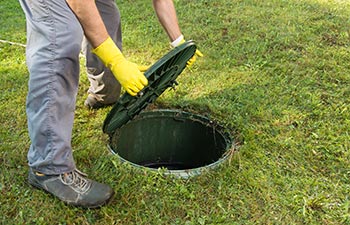
If your home is not served by a public sewer system, your wastewater treatment and disposal is probably operated by a septic system. The key to reaping the significant financial benefit of using a septic tank depends largely upon how well it is installed and maintained.
It is vital to the health of your septic system that you have your septic tank pumped ever 3 to 5 years. Ignoring your septic needs can result in ground and surface water pollution as well as property damage. Perhaps the best way to convince homeowners to schedule routine septic system maintenance is to help them understand how your system actually works and why septic pumping is necessary.
There are many different types of septic systems that accommodate various soil and site conditions. A standard, or gravity fed, septic system has three main components:
- The Septic Tank — The purpose of the septic tank is to separate solids from the wastewater. It does this by storing or partially decomposing the solid material and allowing the effluent (or liquid) to escape to the drainfield.
- The Drainfield — The liquid wastewater (or effluent) is discharged to an absorption field; this is referred to as the drainfield.
- The Soil — Yes, even your soil is a main component of your septic system. The soil below the drainfield provides the final treatment and disposal of the liquid wastewater from the septic tank. The soil’s organisms treat the effluent before it percolates downward and outward, eventually entering ground or surface water. It is important to know your soil type, as this will directly affect your drainfield’s ability to do its job. For example, clay soils do not allow as much wastewater to drain through yet stony soil may be too granular to provide needed treatment.
If you have questions regarding the operation of your specific septic system as well as what maintenance or repairs may need to be done, call a professional. Metro Septic has served the North Georgia area for many years with expert knowledge on septic systems and they recognize how yours can run more smoothly, safely and at the lowest cost to you as a homeowner. Understand your septic system so that you can take care of it best!

